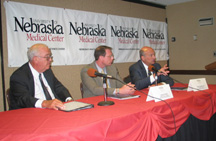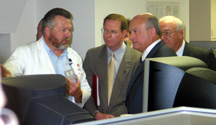Plaudits were abundant as two CDC officials concluded their two-day visit on Wednesday to learn more about Nebraska’s bioterrorism preparedness efforts.
 |
University of Nebraska President L. Dennis Smith, Ph.D., left, participates in a press conference along with CDC officials Joe Henderson, middle, and Ed Thompson. |
“We’ve been very excited what we’ve seen here in terms of cooperation between the public health sector, the clinical medical sector, the academic medical sector, the government and the business community of Nebraska,” said Ed Thompson, M.D., deputy director for the Public Health Programs and Services at the Centers for Disease Control and Prevention in Atlanta.
Dr. Thompson made his remarks at a press conference Wednesday afternoon. The conference followed a morning of meetings in which Dr. Thompson and Joe Henderson, associate director of the CDC’s Office of Terrorism Preparedness and Response, were briefed about many of UNMC’s efforts in bioterrorism preparedness. Henderson said that the two-day trip was the first the CDC officials had made to states to learn of their bioterrorism preparedness efforts.
“One down, 50 to go,” Henderson said. “I think that all of the other states that we visit have a very high bar that they’re going to have to reach to compare to the work we’ve seen done here in Nebraska.”
Although complimentary of the state’s efforts, neither official would tip his hand about whether Nebraska will receive designation as a site for an emergency preparedness laboratory that would augment the CDC’s work. Officials from the University of Nebraska, state government and the business community, as well as members of Nebraska’s Congressional delegation, have pushed for the designation, which would bring much prestige and federal research money to UNMC.
 |
Rod Markin, M.D., Ph.D., left, points to a component of the lab automation system at The Nebraska Medical Center. Looking on are, from left, CDC officials Joe Henderson and Ed Thompson, and NU President L. Dennis Smith, Ph.D. |
Those who are touting Nebraska as a potential home for the National Emergency Preparedness Laboratory Center (NEPLC) point to many strengths in the state. In addition to the scientific expertise of the faculty at UNMC and PKI and the capabilities of LAB-Interlink, Omaha has numerous other advantages, including: its location at the center of the country, away from coastal terrorism threats and a less likely location for international terrorism; it is at the bisection point of major transportation lines, both railroad and road vehicle; StratCom is easily accessible; and it has needed redundancy in fiber-optic networks and other means of communication.
Thompson did indicate that the CDC is “exploring a new concept with you in ways in which your combination of public, private and academic sectors can help protect the public’s health.
Already, he said, the CDC has used Nebraska’s programs as a national model and as a model for other states to follow.
“We’ve seen enough in this visit to know that you have things to show us, and you have things to show other states,” Thompson said. “In that sense, we have already used the Nebraska example in describing how things can be made to work. We had done that before we came here. We’ll do it in more ways, because you have shown us more things.”